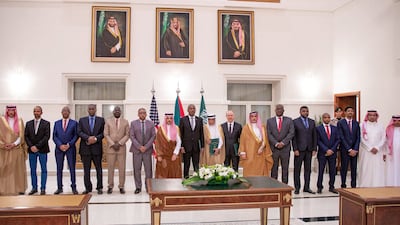Artillery shelling and air strikes rocked Sudan's capital and its two adjoining cities on Sunday, just hours after representatives of the warring army and the paramilitary Rapid Support Forces signed off on a seven-day ceasefire.
Residents said the violence on Sunday morning took place in Khartoum, Omdurman and Bahri and lasted for several hours before dying down.
The ceasefire deal, negotiated in the Saudi city of Jeddah, is scheduled to come into effect on Monday evening with an internationally-supported monitoring mechanism. It also allows for the delivery of humanitarian aid to the millions trapped by fighting in Khartoum and elsewhere in the vast nation.
Several ceasefire deals have been declared since the fighting began on April 15, but they all collapsed just hours, sometimes minutes, after they went into effect. However, the latest truce may have a better chance of survival given that it is the fruition of more than a week of negotiations and will be monitored for the first time by a third party.

On the other hand, there seems to be little appetite for a negotiated settlement of the crisis, with army chief Gen Abdel Fattah Al Burhan taking a series of steps in recent days that could have only deepened his dispute with RSF commander Mohamed Dagalo.
Gen Al Burhan has in the past week fired Gen Dagalo from his post as his deputy on the military-led Sovereign Council, disbanded the RSF, sacked senior army officers seconded to the RSF when they did not return to the ranks of the military, and frozen the assets of the RSF and its associated companies.
The war has so far forced more than one million to flee their homes, seeking refuge within Sudan or in neighbouring countries such as Egypt, Chad, South Sudan and Ethiopia. More than 700 people have been killed since the fighting began, according to the World Health Organisation. The actual death toll, though, is believed to be much higher.
Those left behind in Khartoum face a daily struggle with food shortages, water and power cut and a near total lack of health care. Looting of homes, banks, relief food warehouses and stores is widespread and mostly blamed on RSF fighters and criminal gangs.

“Your armed forces announces its commitment to the text of the [Jeddah] agreement and hopes that the mutinous militia follows suit,” said an army statement. It said the army's acceptance of the deal was to show “appreciation” for the mediation effort made by Saudi Arabia and the US.
The Forces of Freedom and Change, or FFC, a major pro-democracy coalition that once partnered the military in a transitional government, welcomed the Jeddah deal. It said it hoped the deal “will be another step forward on the way to a comprehensive end to this cursed war.”
The joint FFC-military government was formed in August 2019, months after the removal of dictator Omar Al Bashir. He was removed from power by a coup jointly led by current foes Gen Al Burhan and Gen Dagalo.

